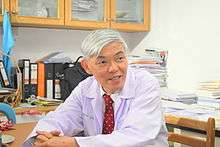Yong Poovorawan
Yong Poovorawan (Thai: ยง ภู่วรวรรณ; born 5 November 1950) is a medical professor in pediatric hepatology at the Faculty of Medicine of Chulalongkorn University in Bangkok, Thailand. He is widely noted for his research in the fields of pediatric hepatology, viral hepatitis and virology, and is regarded as a subject expert on the H5N1 avian influenza virus in Thailand.[1]
Yong Poovorawan | |
|---|---|
 Yong Poovorawan | |
| Born | 5 November 1950 |
| Nationality | Thai |
| Alma mater | Chulalongkorn University |
| Known for | Viral hepatitis H5N1 virology |
| Awards | Mahidol University–B.Braun Prize (2003) Outstanding Researcher Award (1997) |
| Scientific career | |
| Fields | Pediatric hepatology Virology |
| Institutions | Faculty of Medicine, Chulalongkorn University |
Early life and education
Yong Poovarawan was born on 5 November 1950 in Bangkok, Thailand. The fourth of six children, he is the younger twin brother of Yuen Poovarawan, computer scientist and Vice President of Kasetsart University. As a child, his family moved to Nakhon Pathom, where he attended Phrapathom Witthayalai School. He attended upper-secondary school at Triam Udom Suksa School, and graduated Bachelor of Science in 1972 and Doctor of Medicine in 1974 from Chulalongkorn University.[2]
Work
Yong trained in pediatrics at the Chulalongkorn University Faculty of Medicine and completed board certification by the Medical Council of Thailand in 1978. He was subsequently accepted as a faculty member, and received a research fellowship grant at the hepatology department at King's College Hospital Medical School during 1983–84.[3]
He has since worked continuously at Chulalongkorn, mostly focusing on teaching and research, and obtained professorship in 1990. He has served as the head of the faculty's Viral Hepatitis Research Unit and Molecular Biology Research Unit since 1992 and 1996, respectively.
Research
Yong has held a deep interest in research since medical school. He first published in national journals during his first year of residency, and began publishing internationally in 1989, with his work on hepatitis B vaccination.[4] He is author or co-author of over 400 publications in the fields of gastroenterology, hepatology, and virology indexed by the PubMed database,[5] with over 17,000 citations and an h-index of 61 as calculated by Google Scholar.[6]
His works originally focused on the fields of pediatric hepatology and viral hepatitis, especially in applications to the Thai healthcare system, on which such works have had significant impact. Later on they expanded to include virology studies in general. Yong is widely recognized for his work on genetic sequencing and detection of the H5N1 avian influenza virus in Thailand, which saw outbreaks beginning in 2004, and is regarded as the national expert on the subject.
Awards and recognition
Yong has received numerous awards for his contributions to his fields of research, including the following:[3]
- Outstanding Scientist Award (1997), Foundation for the Promotion of Science and Technology
- Outstanding Researcher Award (1997), National Research Council
- Senior Research Scholar (1997–present), Thailand Research Fund
- Mahidol University–B.Braun Prize for Medicine and Public Health (2003)
- Research Citation Award (2003), Thailand Research Fund
- Outstanding Lecturer Award in Health Sciences (2004), Council of the University Faculty Senates of Thailand
- Dushdi Mala Medal for medicine (2007)[7]
- Outstanding Prof. Thailand Research Fund (2012-2014)
- Research Chair Grant, NSTDA (2014)
- Outstanding Achievement Doctor from the Medical Council of Thailand (2018)
- Achievement award in Virology, Genetics Society of Thailand] (2018)
- Achievement award from the National Vaccine Institute of Thailand (2019)
His work on avian influenza in Thailand also received outstanding research awards from the Thailand Research Fund in 2004 and the National Research Council in 2006.
Yong served on the editorial board of the Journal of Pediatrics, in addition to other national publications.
References
- http://www.mfu.ac.th/mfuic2016/?page_id=393
- "เปิดใจ "คุณหมอนักวิจัย" ศ.นพ.ยง ภู่วรวรรณ (Interview with Yong Poovarawan)", วงการแพทย์ (The Medical News) (in Thai), Bangkok: Sapphasarn, 2008, archived from the original on 2012-02-20, retrieved 2009-02-22.
- "Prof.Yong Poovorawan (profile)", Faculty of Medicine, Chulalongnkorn University website, retrieved 2009-02-22.
- Poovorawan, Y; Sanpavat, S; Pongpunlert, W; Chumdermpadetsuk, S; Sentrakul, P; Safary, A (9 June 1989), "Protective efficacy of a recombinant DNA hepatitis B vaccine in neonates of HBe antigen-positive mothers", JAMA, 261 (22): 3278–81, doi:10.1001/jama.261.22.3278, PMID 2523981.
- "Poovorawan, Yong[Author - Full] - PubMed - NCBI". PubMed. National Library of Medicine. Retrieved 28 October 2019.
- "Yong Poovorawan - Google Scholar Citations". Google Scholar. Retrieved 28 October 2019.
- Government of Thailand (13 June 2008), "ประกาศสำนักนายกรัฐมนตรี เรื่อง พระราชทานเหรียญดุษฎีมาลา เข็มศิลปวิทยา (Announcement of the Office of the Prime Minister on the awarding of the Dushdi Mala Medal)" (PDF), Royal Thai Government Gazette (in Thai), 125 (11B), p. 7.
| Wikiquote has quotations related to: Yong Poovorawan |